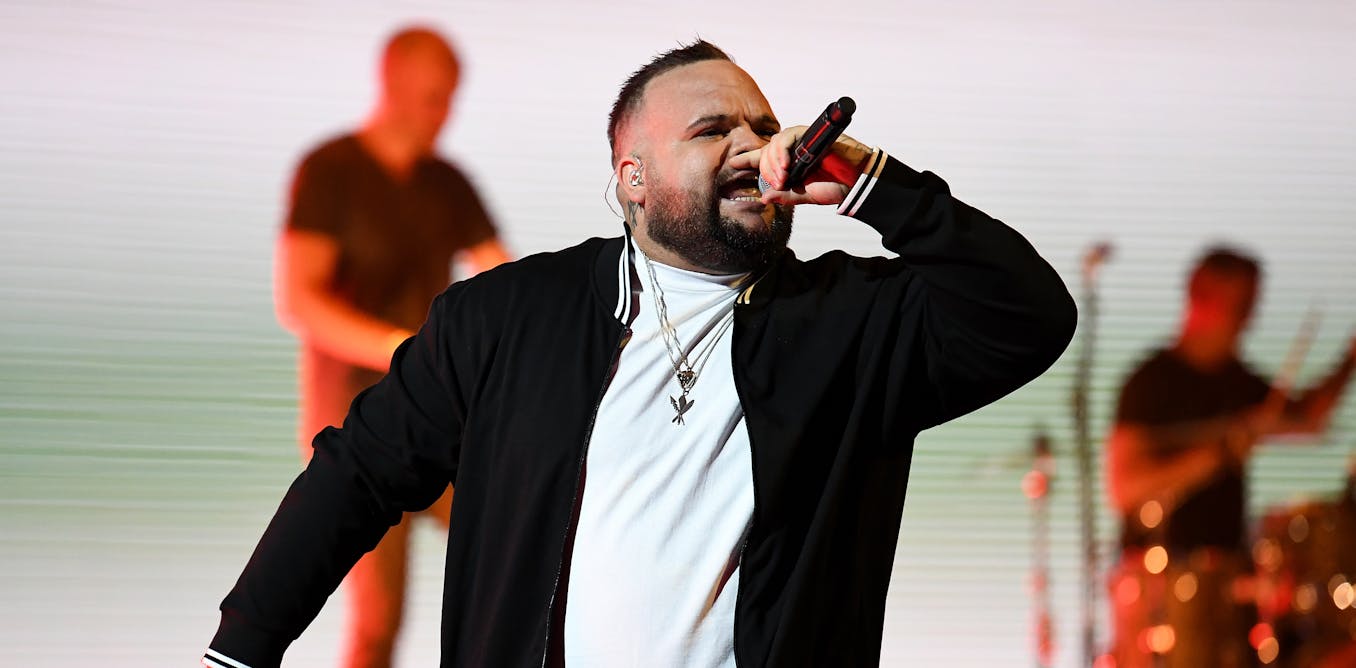
- Select a language for the TTS:
- UK English Female
- UK English Male
- US English Female
- US English Male
- Australian Female
- Australian Male
- Language selected: (auto detect) - EN
Play all audios:
Indigenous rap has been in the spotlight recently with the success of acts such as A. B. Original. The duo has had a year of awards success with their album Reclaim Australia and hit single
January 26: > White Aus still got the black history (that’s true) > And that shirt will get you banned from the Parliament > If you ain’t having a conversation, well then we
starting it Like A. B. Original’s members Briggs (Yorta Yorta man Adam Briggs) and Trials (Ngarrindjeri man Dan Rankine), other Indigenous rappers have been starting public conversations
about white Australia’s black history and producing various forms of hip hop since the 1980s. Rap is one of the most accessible musical genres for people with things to say, but few
opportunities to say them to an audience. One reason for A.B. Original’s success is the nature of the conversations they start – on such topics as police harassment and violence, deaths in
and out of custody, Australia’s history of structural racism and the economies created by white nationalist structures, the long-term effects of those structures on individual and communal
lives, and the desire and will to overcome those effects. These topics are commonplace among many Indigenous Australians, but non-indigenous audiences rarely hear them addressed with such
clarity, as well as both feeling and humour. Dan Sultan, who features on the song January 26, has said that he does not see the song “as a protest”, but “as pointing to the scoreboard”. FROM
THE 80S TO TODAY From its beginnings in the 1980s, Indigenous hip hop has risen in popularity in the 2010s, partly because of the dominance of social media as a means of distribution and
listeners’ engagement with non-mainstream politics in Australia. Early hip hop groups include South West Syndicate (including prolific members Munkimuk (Mark Ross) and Brothablack (Shannon
Williams)) and Native Ryme Syndicate, with members still performing and mentoring new generations of artists. In the early 2000s, Newcastle brothers Predator (Abie Wright) and Wok (Warrick
Wright) formed Local Knowledge with Kabbi Kabbi man Weno (Joel Wenitong) and later Jayteehazard (Jacob Turier). The group split in 2006, with members forming Street Warriors and The Last
Kinection. In the same period, the Wilcannia Mob hit Down River grew out of a Morganics workshop. Gumbayngirri man Wire MC (Will Jarrett) created new hip hop and is succeeded today by his
son, the rising artist Tasman Keith. During this time, Yorta Yorta woman and Greek Australian Little G (Georgina Chrisanthopoulos) was writing and performing about identity, communication
and justice, while Kunai and Gunditjmara woman Miss Hood (Meriki Hood) was building her career as a performer, writer, composer, producer, broadcaster, mentor and activist. Today Indigenous
hip hop is as diverse as ever. In Bourke, a group of school students became B-Town Warriors. Recent acts (among many others) include Meerooni rapper Kaylah Truth in Brisbane, Philly from
Mildura, Izzy N The Profit from Sydney, Butchulla artist Birdz (Nathan Bird) from Katherine, Yuin man Nooky (Corey Webster) from Nowra, Jimblah from Adelaide and Katherine, Noongar artist
Beni Bjah from Perth and Baker Boy (Yolngu man Danzel Baker), who raps in English and Yolŋu Matha. Acts vary greatly in style, approach and musical and lyrical content. In Victoria,
Ceduna-raised Lady Lash (aka Crystal Mastrosavas/Crystal Clyne/Crystal Mercy) celebrates her Greek and Kokatha ancestry and combines hip hop, jazz, soul and opera to produce “spiritual”
music. Her piece Her She Bars begins: > I skated off with my lyrical crown > Head held high with a message so proud > Walk in this world like a rose petal, > Visions of
righteous girl spitting heavy mental > Hold my hands as I follow you into hiding > With the sands swallowed by the silver lining > My mouth dry but I’m hungry for that Microphone
> A live wire got us jumping on these nights I flow… Meanwhile, in the Torres Strait, Mau Power, from the Dhoebaw clan of the Guda Maluilgal nations, raps in Meriam and English, with
his latest single celebrating the late Eddie Koiki Mabo: > His story > Was one about Birthright > History will remember > This great fight > > That moment > Terra
Nullius abolished > Planted a seed for our people > To be Acknowledged… In their different ways, Lady Lash and Mau Power may seem more explicitly celebratory of personal and
collective histories than A.B. Original. But, even as Briggs, Trials and Caiti Baker lyrically contemplate death together in the track Dead in a Minute, they maintain A.B. Original’s humour
and celebrate the power of “talkin’ on the mic” and walking “into the light”: > They want me out the way, in the grave or the prison > A slave to the system so I’m talkin’ on the mic
> To bring black back in fashion as I walk into the light It might be tempting to see A.B. Original’s popular success in 2017 as a sign that non-Indigenous Australians are more open than
they were in the past or that things have improved for Indigenous people across Australia. But, as with Yothu Yindi and other Indigenous groups that gained similar levels of acclaim in the
late-1980s and early-1990s, popularity does not mean things have improved. The fact that the songs on Reclaim Australia needed to be written, that the “scoreboard” had to be “pointed to”,
counters this notion, perhaps as effectively as statistics on Indigenous health and education or the government’s response to the Uluru Statement from the Heart.
:max_bytes(150000):strip_icc():focal(299x0:301x2)/kris-jenner-01-600-1-8d3a8967e02e4871a48a15a05ddf28a8.jpg)







